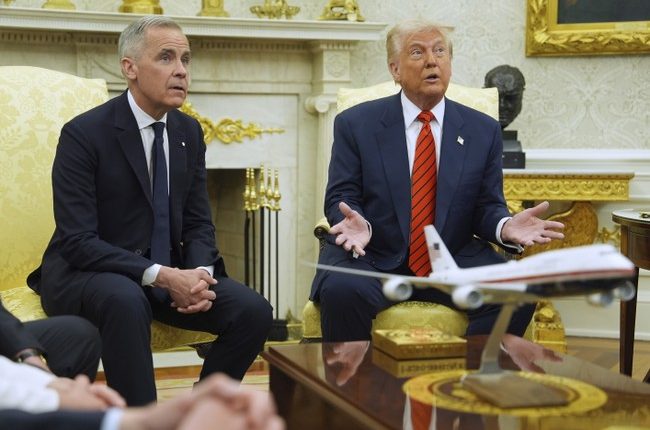
Well, well, well. Three days ago, Canada insisted that it would keep its new digital services tax on American tech companies, despite a G-7 agreement to remove a reciprocal ‘revenge’ tax from the Big Beautiful Bill. In fact, the Canadian revenue authorities planned to start dunning tech companies operating in the country today, and to apply that tax retroactively to 2022.
Trump abruptly ordered a halt to all trade talks with Canada, and warned that Winter Was Coming in reciprocal levies:
We have just been informed that Canada, a very difficult Country to TRADE with, including the fact that they have charged our Farmers as much as 400% Tariffs, for years, on Dairy Products, has just announced that they are putting a Digital Services Tax on our American Technology Companies, which is a direct and blatant attack on our Country. They are obviously copying the European Union, which has done the same thing, and is currently under discussion with us, also. Based on this egregious Tax, we are hereby terminating ALL discussions on Trade with Canada, effective immediately. We will let Canada know the Tariff that they will be paying to do business with the United States of America within the next seven day period. Thank you for your attention to this matter!
Trump then escalated his threats on Fox News yesterday, telling Maria Bartiromo that “Canada is very nasty to deal with,” and that the Canadians “cheat” on the USMCA that Trump negotiated in his first term:
“Maria Bartiromo: You said you’re stopping all trade discussions with Canada?
President Trump:
Until such time as they drop certain taxes, yeah.
People don’t realize Canada is very nasty to deal with. They have charged our farmers up to 400%…
Canada is a very tough country to… pic.twitter.com/f7x7v1R43i— Luke Dalinda (@LukeDalinda) June 29, 2025
Hours later, the Canadians sounded the retreat. Late yesterday, Prime Minister Mark Carney called off collection day and asked the Trump administration to return to the table:
Canada will rescind a digital services tax – a way of taxing online companies – its government said on Sunday, in a bid to restart trade negotiations with the United States. …
“To support those negotiations, the Minister of Finance and National Revenue, the Honourable François-Philippe Champagne, announced today that Canada would rescind the Digital Services Tax (DST) in anticipation of a mutually beneficial comprehensive trade arrangement with the United States,” according to the statement.
“Consistent with this action, Prime Minister Carney and President Trump have agreed that parties will resume negotiations with a view towards agreeing on a deal by July 21, 2025.”
Interestingly, Trump has not commented yet on the Canadian retreat. He spent most of the weekend focused on the reconciliation package, which narrowly succeeded in getting past a key procedural vote yesterday. The Senate will take up the vote-a-rama today, which typically serves as a platform for both sides to register their objections through protest votes, and final passage of the current version of the bill is expected tomorrow. The House will have to bless it after that, which is still an open question, since the Senate parliamentarian forced significant changes from the barely-passed House version.
Credit where due, too: Trump didn’t start the opposition to this tax. Canada floated it in 2023, and the Biden Regency also voiced its objections at the time, according to the Wall Street Journal. The Canadians ignored both the Biden and Trump administrations and claimed the move was necessary to push for a settlement on digital revenue:
On Sunday, the Canadian finance department said in a statement that it had enacted the tax as a stopgap while it worked with other countries, including the U.S., to replace national digital-services taxes. …
Michael Geist, an internet-law expert at the University of Ottawa’s law school, said Canadian officials had ignored warnings from Washington dating back to 2023 about economic repercussions from pursuing a digital-services tax. Both the Biden and Trump administrations argued the digital tax was targeted mostly at U.S. companies.
“Hard to imagine this could have been handled in a worse way,” Geist said about Ottawa’s decision to scrap the digital tax.
Indeed. One might have thought that Carney and the Liberals running the asylum in Ottawa would have figured out now that Trump is just itching for these kinds of fights on trade. Biden wouldn’t have lifted a finger to penalize the Canadians for imposing this tax, but Trump already has a chip on his shoulder about trade deficits and especially with Canada. And for good reason: Trump’s not wrong about Canadian tariffs on US goods, especially in the ag/dairy sector, and now he just has even more reason to get tough on Carney over trade.
Carney finally caved, but not before he made Canada Trump’s #1 target on “globalization” issues. I’d say that Ottawa learned a lesson here, but that assumes facts not in evidence, since they’ve had five months to learn these lessons and still haven’t figured them out.




